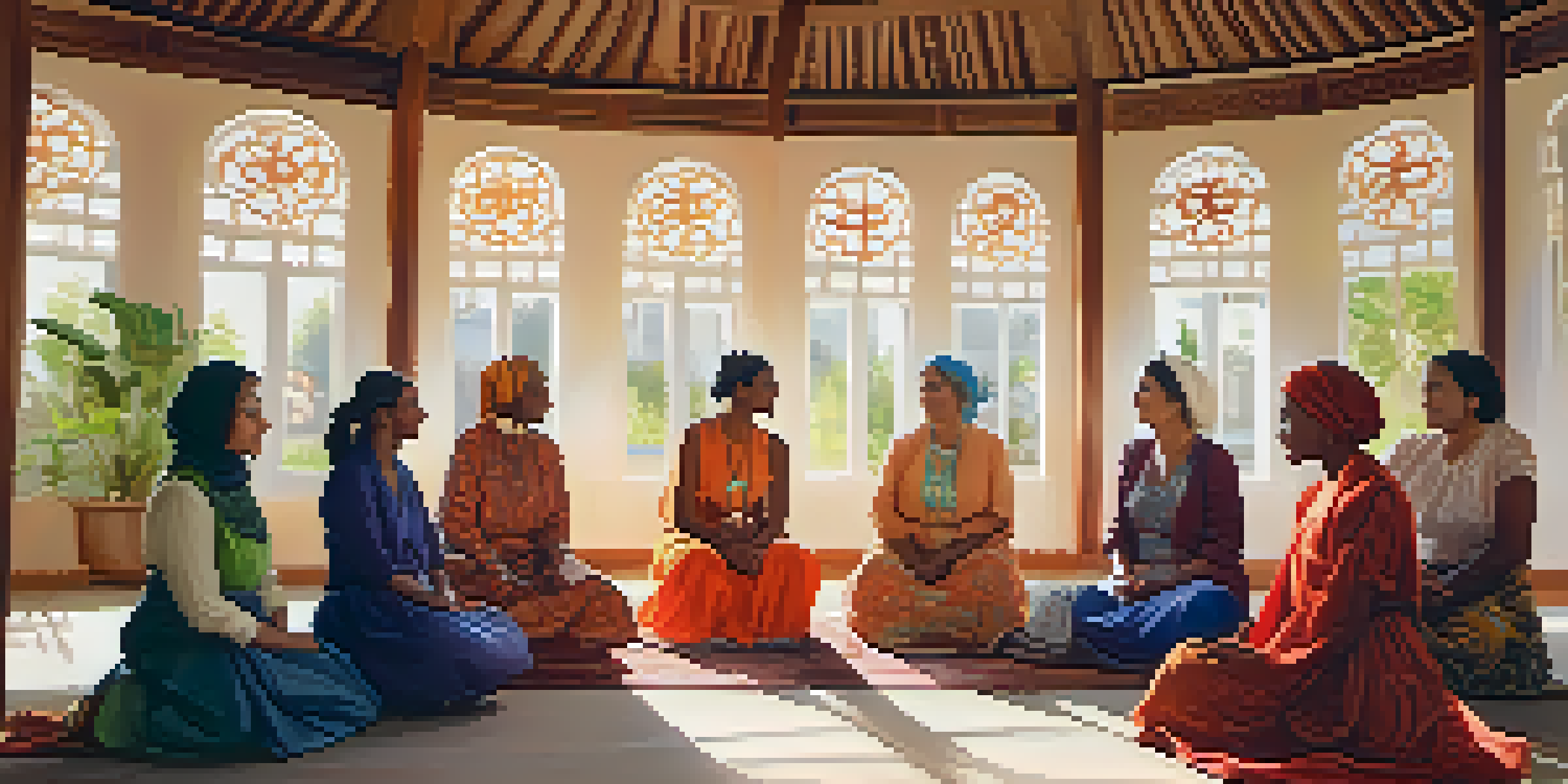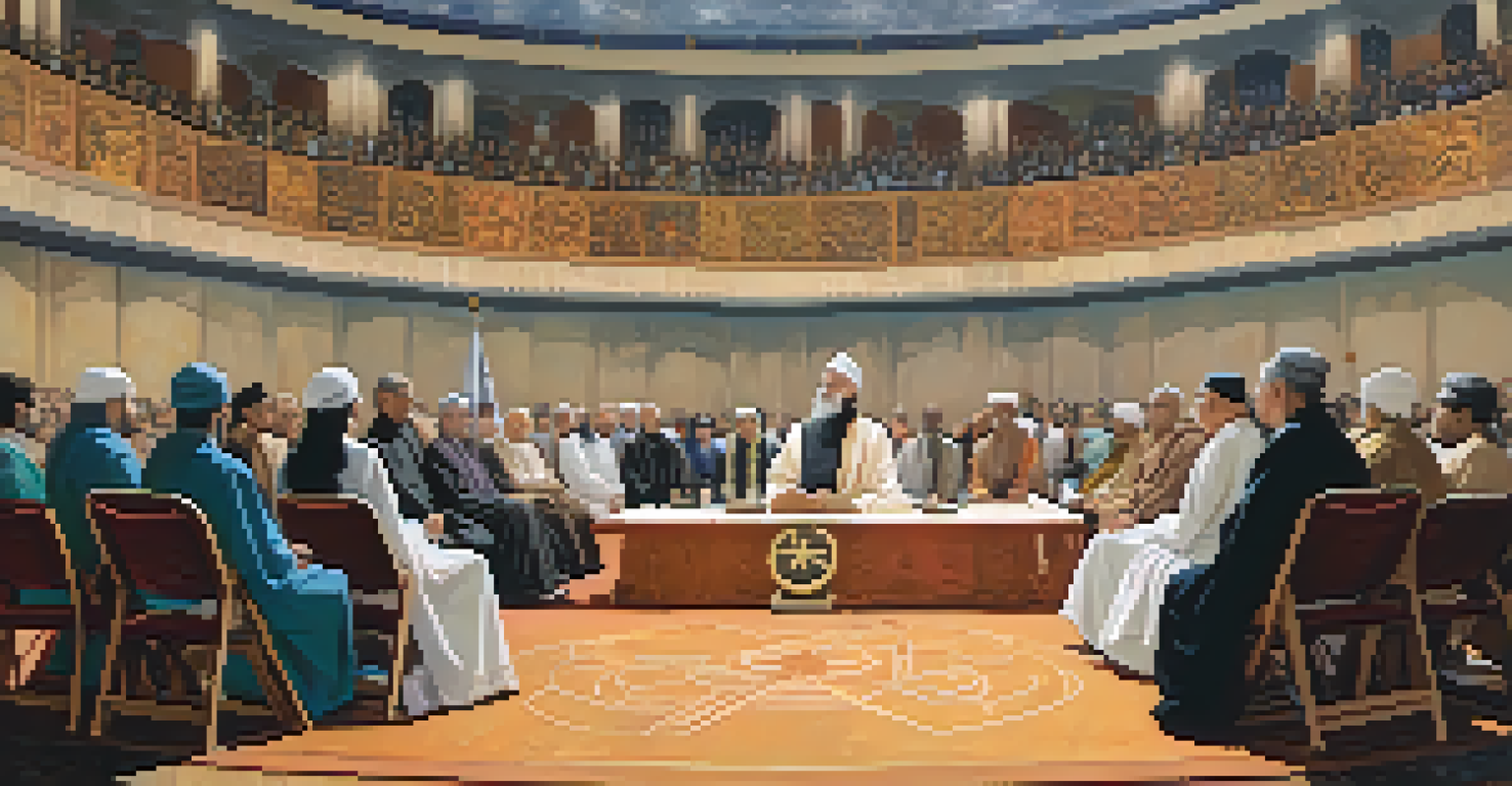Promoting Gender Equality through Interfaith Dialogue Initiatives

Understanding Gender Equality and Its Importance
Gender equality means providing equal rights, responsibilities, and opportunities to all genders. It is crucial not just for women, but for society as a whole, as it leads to economic growth, improved health, and enhanced community well-being. When all voices are heard and valued, we create a more just and equitable society.
Gender equality is not only a fundamental human right, but a necessary foundation for a peaceful, prosperous and sustainable world.
In many cultures and religions, traditional views on gender roles can hinder progress toward true equality. This is where interfaith dialogue can step in, helping individuals from different backgrounds come together to share their perspectives. Such conversations can challenge stereotypes, break down barriers, and ultimately pave the way for greater understanding and respect.
By promoting gender equality through interfaith initiatives, we can foster an environment where diverse perspectives are welcomed. This not only enriches the dialogue but also encourages collaborative efforts to address gender-based issues. When individuals unite across faiths, they can amplify their voices and drive meaningful change.
The Role of Interfaith Dialogue in Society
Interfaith dialogue is a powerful tool for promoting understanding between different religious communities. It provides a platform for people to discuss their beliefs, share experiences, and find common ground. This exchange can lead to mutual respect and collaboration on issues that affect everyone, including gender equality.

In many communities, religious beliefs shape attitudes toward gender roles. By engaging in interfaith discussions, participants can confront harmful stereotypes and challenge discriminatory practices. This can lead to a collective re-evaluation of cultural norms that have historically marginalized women and other genders.
Gender Equality Benefits Everyone
Promoting gender equality is essential for economic growth, improved health, and a more just society.
Moreover, interfaith dialogue encourages individuals to consider how their faith can inspire positive action. Many religious teachings advocate for justice and equality, which can empower communities to work together toward shared goals. This collaborative spirit is essential for achieving significant progress in gender equality.
Successful Interfaith Initiatives Focused on Gender
Numerous interfaith initiatives around the world have successfully focused on promoting gender equality. For instance, the 'Women’s Interfaith Network' brings together women from various faiths to discuss issues affecting their lives and advocate for change. This kind of collective action amplifies their voices and creates a supportive community.
Interfaith dialogue is the best way to understand and respect each other's faith and to work together for peace and justice.
Another inspiring example is the 'Interfaith Alliance for Safe Communities,' which addresses violence against women through collaborative dialogue. By uniting faith leaders and community members, they work to create safer environments for women. Their efforts demonstrate how interfaith collaboration can lead to tangible improvements in gender equality.
These initiatives not only empower participants but also serve as models for other communities. They show how diverse faith groups can come together to tackle pressing social issues. By sharing successful strategies and stories, we can inspire more interfaith efforts focused on gender equality.
Challenges Faced in Interfaith Gender Initiatives
While interfaith dialogue has great potential, it also faces significant challenges. One major hurdle is overcoming deeply ingrained stereotypes and biases within religious communities. These preconceived notions can hinder open conversations about gender equality, making it essential to address them head-on.
Additionally, there may be resistance from some community members who feel threatened by change. This can create tension and conflict within interfaith groups, making it difficult to maintain a productive dialogue. Building trust among diverse participants is crucial for overcoming these challenges and fostering a safe space for discussion.
Interfaith Dialogue Promotes Unity
Engaging in interfaith discussions can challenge stereotypes and foster collaboration on gender-related issues.
To navigate these obstacles, it’s important to establish clear guidelines for respectful dialogue. Facilitators can help create an environment where all voices are valued and heard. By doing so, interfaith initiatives can focus on common goals and work together to promote gender equality.
Strategies for Effective Interfaith Dialogue
To make interfaith dialogue effective, it’s vital to create a welcoming atmosphere. This includes setting ground rules that encourage respectful listening and open-mindedness. When participants feel safe sharing their thoughts and experiences, it lays the groundwork for meaningful conversations about gender equality.
Another important strategy is to include diverse voices in the dialogue. Representation matters; ensuring that women and marginalized groups are part of the conversation can lead to richer discussions. This not only empowers those voices but also enriches the dialogue by bringing in varied perspectives on gender issues.
Finally, follow-up actions are crucial for sustaining momentum. After discussions, participants should outline concrete steps they can take together to promote gender equality in their communities. This could involve collaborative projects, awareness campaigns, or educational programs that continue the conversation beyond the initial dialogue.
The Impact of Interfaith Dialogue on Communities
The impact of interfaith dialogue on communities can be profound. By fostering understanding and collaboration, these initiatives often lead to increased awareness of gender issues. As participants share their experiences, they can inspire others to take action and challenge discriminatory practices within their own communities.
Moreover, interfaith initiatives often cultivate a sense of solidarity among participants. When individuals from different faiths unite for a common cause, it reinforces the idea that gender equality is a shared responsibility. This collective action can lead to significant social change, improving the lives of many.
Challenges in Interfaith Initiatives
Overcoming stereotypes and building trust are crucial for effective interfaith dialogues focused on gender equality.
Ultimately, the positive ripple effects of interfaith dialogue extend beyond the immediate participants. As communities become more aware of gender equality, they can create a culture that values and respects all individuals, regardless of gender. This cultural shift is essential for ensuring long-lasting change.
Looking Ahead: The Future of Interfaith Dialogue and Gender Equality
As we look to the future, the potential for interfaith dialogue to promote gender equality is promising. With increasing global interconnectedness, there are more opportunities for diverse groups to engage in meaningful conversations. While challenges remain, the willingness to collaborate can lead to innovative solutions.
Educational programs that incorporate interfaith dialogue can also play a crucial role in shaping future generations. By teaching young people the value of diversity and inclusion, we can empower them to challenge gender stereotypes and advocate for equality. This long-term investment in education is vital for creating a more equitable society.

In conclusion, promoting gender equality through interfaith dialogue initiatives is not just a possibility; it’s a necessity. As communities continue to engage in these conversations, they can build a foundation for a more just and equal world. The journey may be long, but the collective effort is what will bring about meaningful change.